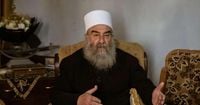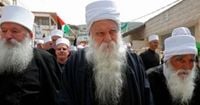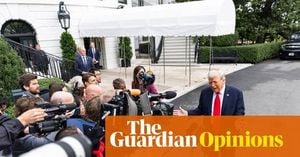In a significant political development in Syria, the religious leader of the Druze community, Sheikh Hikmat al-Hijri, has publicly rejected the newly proposed constitutional declaration put forth by President Ahmed al-Shar'. This announcement, made on March 19, 2025, reflects deepening concerns regarding the political representation and stability of the Syrian state amid ongoing turmoil.
Sheikh al-Hijri emphasized that the constitutional declaration does not resonate with the aspirations of the Syrian populace for a genuine participatory democracy. In remarks relayed by "Syria TV," he urged for a framework that acknowledges Syria's historical and cultural uniqueness, stating that any new system must allow for the independence of authorities in a substantial manner rather than perpetuating authoritarian control. "The proposed declaration is an insult to the authorities and undermines local administrative powers," he remarked, suggesting that changes are necessary to ensure fair representation for all communities within Syria.
His statements come at a particularly critical junction for the country, which has been grappling with a host of political challenges, including the need to secure stability and truly democratic representation amidst escalating tensions among various ethnic and cultural groups. Sheikh al-Hijri has long served as a pivotal figure within the Druze community, known for his advocacy for rights and recognition of minority groups within the Syrian state. His call for restructuring the constitutional declaration aligns with sentiments expressed by other political factions such as the Syrian People's Initiative Party and the Syrian Democratic Council.
The Syrian People's Initiative Party has also voiced that the newly proposed declaration does not meet the essential demands of the current stage, arguing it lacks alignment with the principle of "rule of the people by the people." Similarly, the Syrian Democratic Council has firmly rejected the declaration, view it as an obstacle to the democratic transition process and a dismissal of transitional justice requirements. This unanimity among political factions showcases the growing discontent regarding the current regime's approach to constitutional reform.
The Kurdish National Council additionally criticized the constitutional declaration, asserting that it is framed from a perspective grounded in "one nation, one religion," which fails to protect the rights of Syria's diverse national and religious components. This significant pushback highlights the broader concern among various groups that the government is not only overlooking critical democratic ideals but also perpetuating an exclusionary framework that could further exacerbate sectarian divides.
Concerning the emerging dynamics, it should also be noted that the constitutional declaration, announced by President al-Shar' on January 29, 2025, was described as a foundational framework for Syria's transitional phase. It origin selling view was to establish a legal backbone to navigate the complexities of governance post-conflict. Yet, the designation of Islam as the principal source of legislation and the maintenance of centralized presidential power have raised alarm bells.
The specifics of this declaration list several controversial articles, including ones declaring the state as the Arab Republic of Syria, asserting that the president must be of Islamic faith. The new document also highlights rights concerning expression, media, and property but confines the presidential powers that would ultimately have to be checked by the National Assembly.
Furthermore, in light of regional tensions, analysts are raising concerns over Israel's perceived influence with Syria's Druze community. Political commentators suggest that attempts to cultivate relationships with minorities, including the Druze, could add another layer of complexity to the already tumultuous political landscape, with potentially destabilizing ramifications for Syria.
Skepticism regarding these external influences was underlined by Sheikh al-Hijri in earlier statements where he remarked on the precarious situation concerning communal and elitist policies, warning that they pose threats to Syria’s stability as a whole. Moreover, al-Hijri accused the new government of adopting extremist policies that endanger Syrian society broadly, including pressure on the Druze community.
This backdrop of unease regarding political representation is resonating with many Syrian citizens who fear that the impending constitutional framework might allow for a continuation of unfair power dynamics. Sheikh al-Hijri’s rejection embodies a poignant challenge to President al-Shar'’s government, signaling a demand for change that reflects the plurality and vitality of Syrian society.
As political factions rally against the constitutional declaration, it indicates a potential unification among diverse groups in Syria striving for a more representative and just political system. The demand for meaningful participation in governance instead of a systemic exclusion forms the crux of this growing movement for reform.
Consequently, the declaration’s rejection by religious leaders, political groups, and marginalized communities hints at a broader societal call for political evolution that resonates deeply within the fabric of Syrian life.
Through Sheikh Hikmat al-Hijri’s clarion call against the current draft, a pathway emerges toward addressing the discontent that has crystallized among various sections of the population, emphasizing a need to build an inclusive future.





